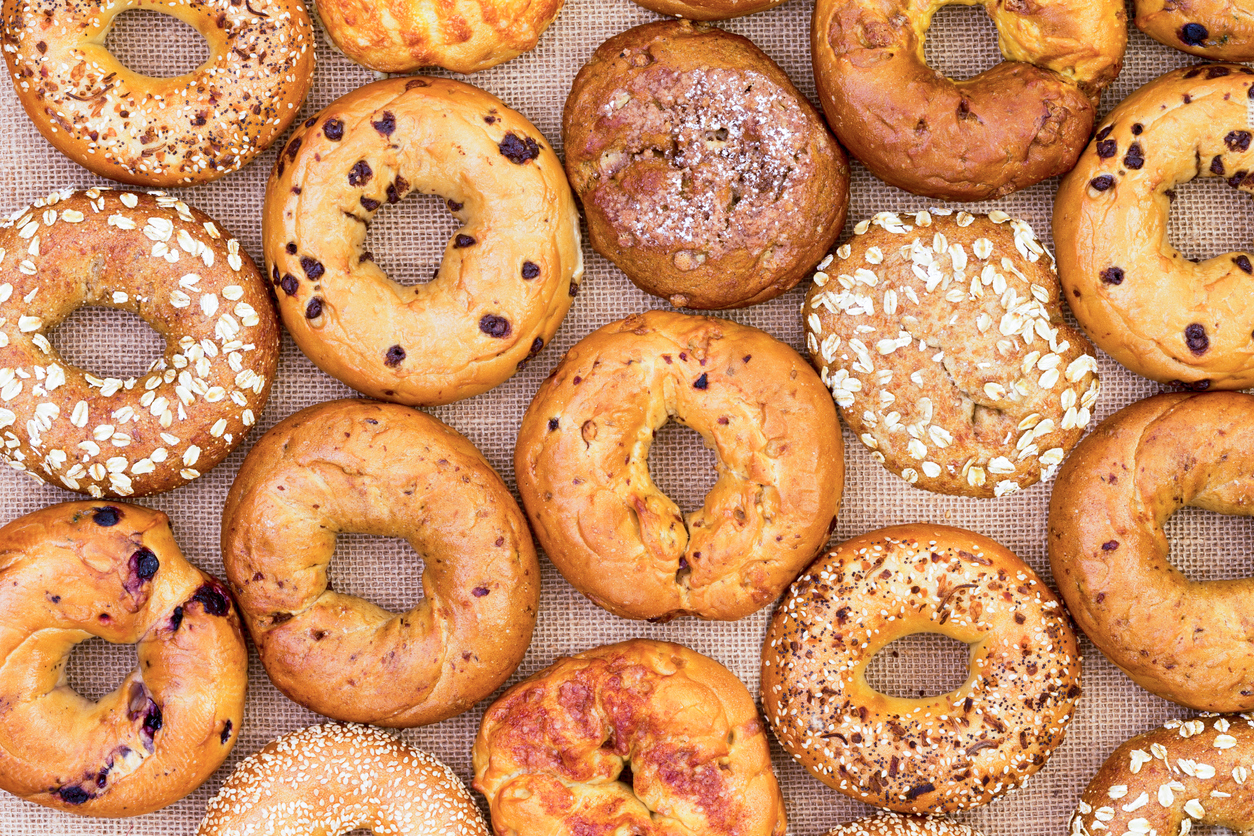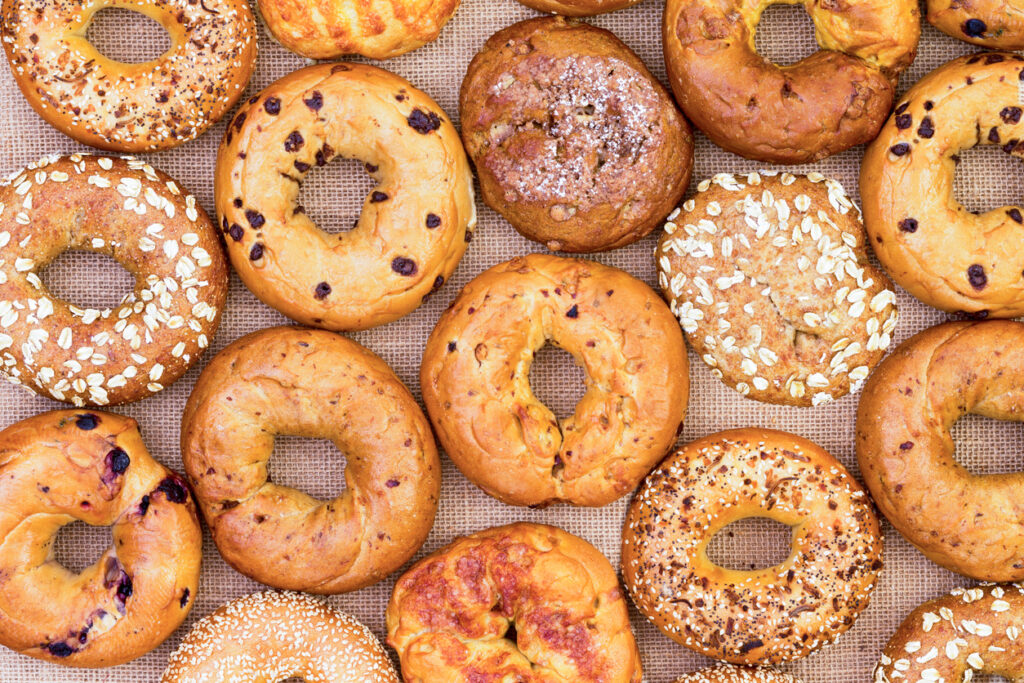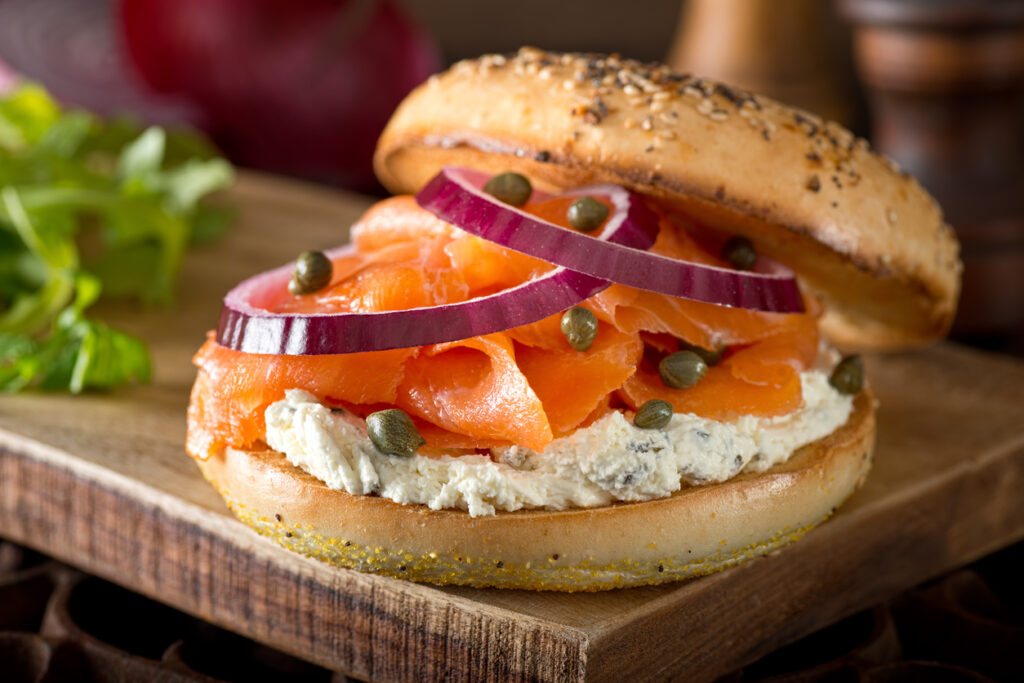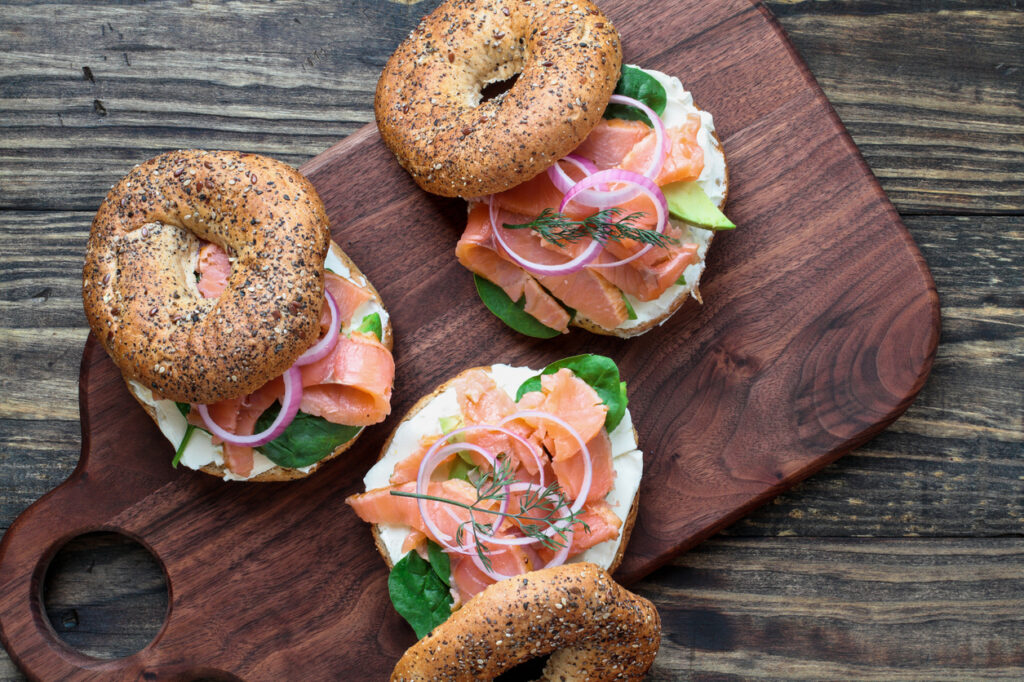
The History of the Bagel.
Fermented yeast dough is rolled into a perfect circle. This is then boiled and baked to perfection, sealing in the chewy moisture. A relative of the pretzel, let’s take a bite of the fascinating history of the bagel.

The history of the bagel dates back to Eastern Europe.
The history of the bagel dates back to Eastern Europe. There were bagel prototypes in Austria, Poland, and Russia. But the bagels we’re familiar with arose as a response to anti-Semitic statutes saying that Jews couldn’t bake bread. However, the bagel was a loophole around this inconvenience. Boiling the dough before baking it allowed Jewish people to bake bread.
The history of the bagel dates back to the late 19th century.
The history of the bagel dates back to the late 19th century. Eastern European Jewish immigrants brought their traditional bread-making techniques with them to the United States. The bagel was considered a treat in their homeland. It quickly became a popular food in Jewish communities throughout New York City, particularly in Brooklyn.
A Jewish immigrant named Harry Lender was pivotal in popularizing the bagel across the United States.
A Jewish immigrant named Harry Lender was pivotal in popularizing the bagel across the United States. He opened his company in 1927, Lender’s Bagels, in New Haven, Connecticut. He was a pioneer of pre-packaged bagels. However, it was the bakeries in Brooklyn that became famous for their high-quality, artisan bagels.

The secret to Brooklyn bagel’s unique taste and texture is the pristine water used for the dough.
The secret to Brooklyn bagel’s unique taste and texture is the pristine water used for the dough. The city’s water supply, which comes from the Catskill Mountains, has a high mineral content. This gives the dough its distinct flavor and texture.
Over time, the bagel became a loved food among people of many backgrounds.
Over time, the bagel became a loved food among people of many backgrounds. Today it is enjoyed by millions of people around the world. However, the bagels made in Brooklyn are still considered by many to be the best.
Today, there are many iconic bagel shops in Brooklyn that continue to make authentic bagels using traditional, age-old techniques.
Today, there are many iconic bagel shops in Brooklyn that continue to make authentic bagels using traditional, age-old techniques. Additionally, these shops are an important part of the city’s culinary heritage. Continually, they attract visitors from around the world who are looking for an authentic taste of Brooklyn.

In addition to the doughy perfection of the Brooklyn bagel, its history is also an important part of its appeal.
In addition to the doughy perfection of the Brooklyn bagel, its history is also an important part of its appeal. The history of the bagel has been a symbol of Jewish culture for centuries. Put plenty of lox and schmear on my bagel!
Over time, the popularity of the bagel spread beyond the Jewish community, and became a staple food in New York City.
Over time, the popularity of the bagel spread beyond the Jewish community, and became a staple food in New York City. Today, the bagel is a beloved food around the world. But the Brooklyn bagel remains a cultural icon and a symbol of the city’s rich culinary heritage.
There is something undeniably soothing about a bagel shop in the morning.
There is something undeniably soothing about a bagel shop in the morning. The sun may be streaming in or it’s cold and rainy. You walk in and are instantaneously bathed in smells. The first one you typically notice is fresh coffee. Then the freshly baking dough hits your nose. Then the everything seasoning. What is that you smell now? Bacon and cheese? It is a symphony of scents.

Bagel shops are a sensory experience. The first thing most notice are the smells. Next there are the sounds.
Bagel shops are a sensory experience. The first thing most notice are the smells. Next there are the sounds. Bagel shops are usually pretty loud. There is a clattering of plates and cutlery, sizzling eggs or something or other. People behind the counter barking orders to each other. The sounds can also be more quiet like a cup of coffee being poured or people chatting. It’s a whole vibe.
There is a certain look that Brooklyn and NYC bagel shops have.
There is a certain look that Brooklyn and NYC bagel shops have. They’re indistinguishable from delis mostly. But all of the sounds and smells create such a unique experience. As previously stated, this is the cultural significance of the Brooklyn bagel.
The history of the bagel continues marching on.
The history of the bagel continues marching on. Many of the iconic bagel shops in Brooklyn have been around for decades. These shops continue to make bagels using the age-old, traditional techniques. It is no wonder these places have life-long customers. Bagel shops are simply a great way to start your day.
In recent years there has been a resurgence of interest in traditional food-making techniques.
In recent years there has been a resurgence of interest in traditional food-making techniques. The bagel has become a symbol of this movement. Even artisanal bakers and chefs around the world now make their own versions of the Brooklyn bagel. Using high-quality ingredients and traditional techniques, they give us a run for our money! But nothing could take its place.
Overall, the history of the bagel is a testament to the power of food.
Overall, the history of the bagel is a testament to the power of food. Indeed, no matter our differences, we can all agree that bagels are good. Brooklyn bagels have the power to bring people together and inspire to preserve cultural traditions.

There are so many bagel shops in Brooklyn that are worthy of trying. I will recommend some. There is:
-Highway Bagels, the oldest operating bagel shop, in Midwood.
-Terrace Bagels in the beautiful Windsor Terrace.
-Bagel World, with Park Slope and Downtown locations.
-Bagel Pub in Sunset Park.
-Sam’s Bagels in Bay Ridge.
-Bagels & Beyond in Gravesend
-Emmons Bagels in Sheepshead Bay.
-Olde Brooklyn Bagel Shoppe in Prospect Heights.
-Baker’s Dozen in Williamsburg/Greenpoint.
-Abracadabra in Bushwick caters to vegetarian and vegan people.
The bagel remains one of the most versatile cuisines. You can make it sweet or savory. Is there anything that should never go on a bagel? Let us know in the comments!
Read more about bagels here:
https://en.wikipedia.org/wiki/Bagel
Read more about Brooklyn and Manhattan cuisine in our article A Taste of Katz’s!
https://172-234-236-52.ip.linodeusercontent.com/a-taste-of-katzs/

